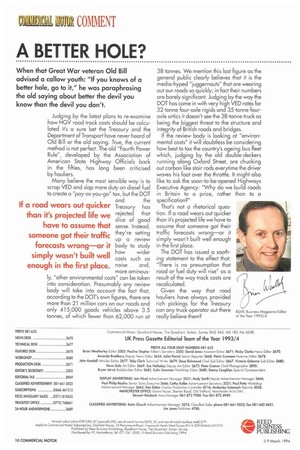A BETTER HOLE?
Page 12

If you've noticed an error in this article please click here to report it so we can fix it.
When that Great War veteran Old Bill advised a callow youth: "If you knows of a better hole, go to it," he was paraphrasing the old saying about better the devil you know than the devil you don't.
Judging by the latest plans to re-examine how HGV road track costs should be calculated it's a sure bet the Treasury and the Department of Transport have never heard of Old Bill or the old saying. True, the current method is not perfect. The old 'Fourth Power Rule", developed by the Association of American State Highway Officials back in the fifties, has long been criticised by hauliers.
Many believe the most sensible way is to scrap VED and slap more duty on diesel fuel to create a "pay-as-you-go" tax, but the DOT and the Treasury has rejected that slice of good sense. Instead, they're setting up a review body to study how wider costs such as noise and, more ominous ly, "other environmental costs" can be taken into consideration. Presumably any review body will take into account the Fact that, according to the DOT's own figures, there are more than 21 million cars on our roads and only 415,000 goods vehicles above 3.5 tonnes, of which fewer than 62,000 run at 38 tonnes. We mention this last figure as the general public clearly believes that it is the media-hyped "juggernauts" that are wearing out our roads so quickly; in fact their numbers are barely significant. Judging by the way the DOT has come in with very high VED rates for 32-tonne four-axle rigids and 35-tonne fouraxle artics it doesn't see the 38-tonne truck as being the biggest threat to the structure and integrity of British roads and bridges. If the review body is looking at "environmental costs" it will doubtless be considering how best to tax the country's ageing bus fleet which, judging by the old double-deckers running along Oxford Street, are chucking out carbon like stair rods everyhime the driver waves his foot over the throttle. It might also like to ask the soon-to-be-opened Highways Executive Agency: "Why do we build roads in Britain to a price, rather than to a specification?"
That's not a rhetorical question. if a road wears out quicker than it's projected life we have to assume that someone got their traffic forecasts wrong—or it simply wasn't built well enough in the first place. The DOT has issued a soothing statement to the effect that: "There is no presumption that road or fuel duty will rise" as a result of the way track costs are recalculated.
Given the way that road hauliers have always provided rich pickings for the Treasury can any truck operator out there really believe them?
















































































